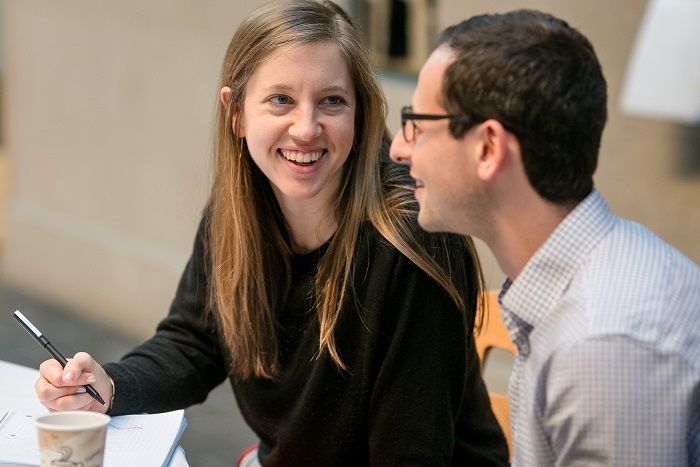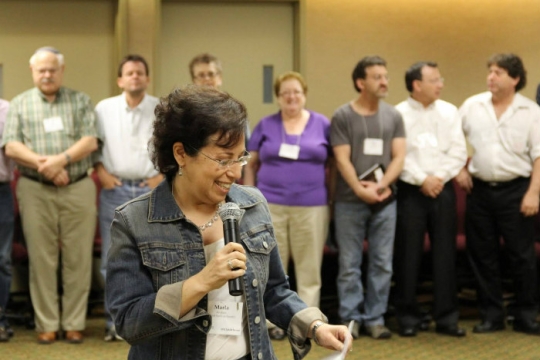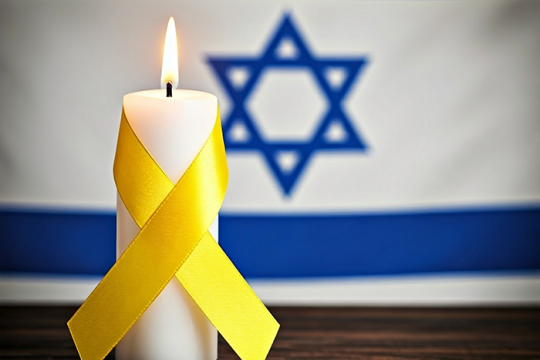
Our community is at an inflection point. It has become increasingly hard to speak with anyone who doesn't agree with our deeply held opinions, or we feel confused and isolated when we are uncertain of our opinions while surrounded by people who "feel sure." In the 24/7 news cycle, political and social rhetoric are divisive and designed to be sensational so we keep watching. This impacts our society in a negative way, making it harder for people to speak with openness and vulnerability with anyone who doesn't 100% align with their own deeply cemented beliefs. This environment is not conducive to curiosity, which is a key component of meaningful relationships.
Instead of turning inward and only speaking with those we know align with our own ideas, it is now more critical than ever to keep dialogue open - especially with those we may disagree with. The relationships we hold with people who disagree with us are an important part of our future. We must continue to build connections based on our shared humanity, not our different political definitions and identities. Instead of writing off people or organizations who have different ideas than we do, those who have the energy and space to be in dialogue should lean into our values of shared humanity, learning, and evolving. We can lean in as Abraham did in Genesis 18:23. When Abraham disagreed with God's suggestion of what to do with Sodom and Gomorrah, Abraham went to meet (vayigash) with God, trying to navigate toward common ground and mutual understanding despite disagreement.
The guide below offers some frameworks and shared agreements for structured group conversation as well as some suggested questions.
How to ensure fertile ground for a productive conversation:
Consider carefully who you would like to bring together for dialogue. Are you hoping to bring together people who are already members of your community? Is there a specific subset of folks who you'd like to start with? Are you looking to host conversations with people in another faith group? Be intentional about who is invited and why.
Dialogue around any complicated topic is hard when emotions run high. Before agreeing to a conversation, it is important to assess if you, as the facilitator, and the people you would like to convene are emotionally ready to be in dialogue. In a healthy conversation, Robbie Gringas, co-founder of For the Sake of Argument, explains, "we learn, we grow, we gain more perspectives. A healthy argument creates a community of fellow-grapplers, even when they disagree." Yet how can we ensure a healthy conversation as we mourn so much? In this recent blog, Robbie Gringas shares two questions that are an emotional test of readiness for a conversation during this time of collective trauma. He contends that if participants can agree to both statements below, then they are emotionally ready for a productive conversation:
"A. I cannot accept the actions of Hamas on 7 th October, in deliberately attacking civilians of all ages, murdering over a thousand and kidnapping some two hundred people.
B. I cannot accept the destruction of Gazan homes, the collective punishment of Gazan civilians, and the deaths of thousands of Gazan civilians as 'collateral damage.'"
If you or the participants you hope to gather cannot accept both of these statements, then it's not the right time to talk. It means more time is needed to care for emotions - and that's okay.
How to talk so that people will listen and listen when others talk:
Many times, the discussion of sensitive politics, especially about issues pertaining to identities, is not only or mainly about what you say or your arguments. Rather, it's about engaging in a conversation with people who staunchly disagree with you or who try to delegitimize your opinions or identity.
The ideas below are adapted from Dr. Sivan Zakai's research and work on Israel education, Encounter's communications agreement, Resetting the Table's guidelines, Project ORLIE's norms for discourse, and Facing History and Ourselves' classroom contract. These agreements could serve as a set of norms for a productive conversation.
- We assume positive intent while acknowledging that intent is different than impact. Assume that everyone brings good intentions and cares deeply. For example: all participants are committed to the survival of the Jewish people. Understand that intent does not always match impact. Acknowledge when something is said that is harmful by using "I statements."
- Understand that each person is speaking for themselves, not representing an entire group.
- Express opinions with respect, humility, and thoughtfulness; listen carefully and with resilience, even when something is hard to hear. A productive conversation about a hard topic is most often about providing open space - persuasion is not the goal. This conversation is meant to provide an open space for listening with open ears and open hearts. Try to understand what someone is saying before you rush to judgment.
- Share airtime - make sure each participant has time to take space and makes space for others.
- Avoid making broad generalizations and grand pronouncements. Participants should connect what they know and believe to their lived experiences and particular sources of information.
- Knowing that there may be hard points in this conversation, one can "pass" or "pass for now" if not ready or willing to respond to a question. They can also ask for a break if time is needed to participate with a clear mind.
- Honor confidentiality - what is shared here stays here; what is learned here leaves here.
In their guide, "Constructive Conversations about the Israeli-Palestinian Conflict," the Public Conversations Project shares tips on well-crafted questions:
Our norm in conversations often involves people putting forth positions and offering arguments to support those positions. One way to invite a new conversation-one intended not for winning, but for understanding-is to craft questions that ask people to:
- Speak personally, rather than as a representative of a group.
- Shift from expressing positions to expressing underlying dreams, hopes, concerns, and fears.
- Speak about uncertainties, complexities, and gray areas in their thinking, as well as what they know.
- Share stories about ways in which their views, hopes, and concerns may have been shaped by their life experiences.
- Explore the meanings of buzz words or emotionally charged terms that have different meanings and connotations for different people.
- Encourage participants to reflect on the assumptions, values, and worldviews that shape their thinking. For example, participants can examine their assumptions about what information can be trusted, ideas about how something happens, and worldviews related to the lessons of history.
The questions we ask encourage participants to expand the range of experiences and information that they pay attention to and share with others. When participants speak from the full range of their thoughts and experiences, they begin to listen more fully to each other, become genuinely interested in each other, and develop greater trust in each other.
The questions we ask also lead participants to reflect on their own perspectives in new ways. When the armor required for debate is discarded and people set aside a mindset that searches for ways to further support their own arguments, confirm what they already think, and undermine the arguments of others, they gain understanding about others and themselves.
When posing a question, check to make sure that it is:
- Open-ended, not amenable to "yes" or "no" answers.
- Non-rhetorical.
- Not leading or biased.
- Unlikely to reinforce unhelpful dichotomies.
Potential Questions:
- What are our underlying assumptions about Israel? Hamas? Israelis? Palestinians? (And why?)
- What do you worry about most in relation to the current conflict?
- How do my feelings about Israel and/or the current conflict impact how I'm showing up in the world?
- Where do we go from here? What is our hope for the future?
- What real difference can we make?
Sample Agenda:
Before meeting, consider asking each participant if they can agree with the two statements above (Robbie Gringas's emotional test of readiness) to determine their readiness for a productive conversation. Once they agree, you may also want to share the norms of the conversation so everyone has the same expectations of the environment they will be creating.
At the meeting:
- Begin with building relationships
- Reshare the norms
- Make them visible by posting them so all can see or distribute them on paper.
- Remind people that you (or another agreed-upon group member) will help hold the group accountable, interrupting as needed to stick to the norms.
- Share the purpose of the conversation: Encouraging participants to share their concerns, values, beliefs, and hopes (or something similar).
- Questions:
- Share a question, then give the group time to answer. You might want to propose a time limit on responses so that each person who wants to is given the chance to speak.
- After each question, pause for reflection.
- Repeat with additional questions as needed.
- Conclusion:
- Summarize what was shared during the session and express deep gratitude for participation with empathy and vulnerability.
- Ask if there are next steps for the group to take - perhaps it's another conversation, perhaps it's a shared project together, or perhaps this conversation was enough for now.
- Consider ending with some kind of shared blessing, poem, or song.
Request your free download: Every Voice Matters: Conversations about Voting & Democracy, with conversation questions to foster respectful, open-hearted conversations in this election season, and beyond. For teens and adults.
Talk for a Change is a Reform Movement initiative helping people have open conversations around difficult topics. Download our free Conversation Cards and Guide today!
Related Posts

Why the Scheidt Seminar Is A Transformative Leadership Experience

Five URJ Pages to Bookmark Today

